Discover That Hoarder: Overcome Compulsive Hoarding
That Hoarder: Overcome Compulsive Hoarding

That Hoarder: Overcome Compulsive Hoarding
Author: That Hoarder
Subscribed: 182Played: 6,708Subscribe
Share
© 2023 Overcome Compulsive Hoarding with @ThatHoarder
Description
Hoarding disorder is stigmatised and people who hoard feel vast amounts of shame. This podcast began life as an audio diary, an anonymous outlet for somebody with this weird condition. That Hoarder speaks about her experiences living with compulsive hoarding, she interviews therapists, academics, researchers, children of hoarders, professional organisers and influencers, and she shares insight and tips for others with the problem. Listened to by people who hoard as well as those who love them and those who work with them, Overcome Compulsive Hoarding with That Hoarder aims to shatter the stigma, share the truth and speak openly and honestly to improve lives.
225 Episodes
Reverse
Come to a Dehoarding Accountability Zoom Session: http://www.overcomecompulsivehoarding.co.uk/ticket
Subscribe to the podcast: https://www.overcomecompulsivehoarding.co.uk/subscribe
Podcast show notes, links and transcript: http://www.overcomecompulsivehoarding.co.uk/
Getting on top of hoarding disorder isn’t about powering through in one big go. It’s all about slowing down, pacing ourselves, and making sure our approach is actually sustainable, both for our bodies and our minds.
In this episode, I talk honestly about the risks of burnout and emotional overload when we try to rush the process, and why giving ourselves permission to work in small, manageable steps is key.
I’ll share practical ways to set our own pace, spot the warning signs of pushing too hard, and celebrate the progress we make - even when it’s slower than we’d like.
The Nature of Recovery from Hoarding Disorder
Recovery isn’t a race or a sprint
Pressure to fix things quickly—internal and external
Debunking the ‘quick fix’ myth
Importance of sustainability in recovery
Physical Aspects of Dehoarding
Physical tasks: sorting, organising, donating, recycling
The relentless and exhausting nature of physical dehoarding
Risks of pushing too hard:
Physical exhaustion and injury
Impact of chronic pain, health problems, disability
Decision-making fatigue from exhaustion
The danger of creating a more overwhelming mess
Risks of Burnout
Burnout as a consequence of overexertion
Emotional impact: quitting, avoidance, dread
Dehoarding becomes associated with pain and suffering
Emotional Aspects of Pacing
Unique emotional relationships with possessions
Associations, memories, grief, nostalgia, identity
Anxiety and emotional flooding in decision-making
The consequences of pushing past emotional limits:
Panic, anxiety, rumination
Avoidance and procrastination
Loss of confidence in decisions
Swinging between extremes: keeping everything vs. discarding everything
The Impact of Emotional Flooding
Damaging relationship with recovery
Recovery viewed as painful or traumatic
Unrealistic expectations for overnight emotional change
Persistence of difficult emotional patterns despite progress
Non-Linear Nature of Progress
Understanding setbacks and relapses as part of the process
Importance of patience and realistic expectations
The need to build new emotional and cognitive pathways over time
Positive Signs of Emotional Progress
Ability to sit with discomfort and uncertainty
Recognising and managing patterns and triggers
Gradual increase in resilience and emotional tolerance
Recognising Gradual Physical and Emotional Recovery
Improved recovery time after difficult sessions
Growing confidence in handling challenges
Learning that healing and progress are not linear
Practical Approaches to Pacing
Time-based strategies:
Working in manageable time chunks
Scheduling regular breaks and days off
Focusing on sustainable, consistent sessions over marathons
Decision-based strategies:
Limiting the number of decisions per session
Identifying easier vs. harder tasks or categories
Quick wins to boost motivation
Checking in with oneself physically and emotionally during work
Building in soothing or rewarding activities post-session
Signs of Sustainable Pacing
Completing sessions feeling tired but not destroyed
Feeling able to return for future sessions without dread
Making decisions that feel good in retrospect
Enjoyment and pride in gradually improving one’s space
Adapting Pace to Life Circumstances
Pace varies with health, mood, season, responsibilities
Finding what works for the individual and the current season of life
Compassionate Recovery
The importance of self-compassion in setting and respecting limits
Celebrating progress and honouring our human experience
Links
Come to a Dehoarding Accountability Zoom session: Accountability Booking Form
Website: Overcome Compulsive Hoarding
Become a Dehoarding Darling
Submit a topic for the podcast to cover
Questions to ask when dehoarding: https://www.overcomecompulsivehoarding.co.uk/podquestions
Instagram: @thathoarderpodcast
Twitter: @ThatHoarder
Mastodon: @ThatHoarder@mastodon.online
TikTok: @thathoarderpodcast
Facebook: Overcome Compulsive Hoarding with That Hoarder
Pinterest: That Hoarder
YouTube: Overcome Compulsive Hoarding with That Hoarder
Reddit: Overcome Compulsive Hoarding with That Hoarder subreddit
Help out: Support this project
Sponsor the podcast
Subscribe to the podcast
Subscribe to the podcast here
Come to a Dehoarding Accountability Zoom Session: http://www.overcomecompulsivehoarding.co.uk/ticket
Subscribe to the podcast: https://www.overcomecompulsivehoarding.co.uk/subscribe
Podcast show notes, links and transcript: http://www.overcomecompulsivehoarding.co.uk/
On this episode, I’m joined by Dr Jan Eppingstall to unpack how our possessions connect with our sense of identity and self-concept, and why letting go can feel so threatening for those of us who hoard.
We talk through how objects hold meaning, memories, and dreams for the future, and what it looks like to build a stronger sense of self without clinging to things.
If you’ve ever felt like discarding something meant losing a part of yourself, you definitely want to listen to this one. We break down exactly why that fear happens and where to start.
A plant pot associated with negative experiences.
Discussion of emotional and aesthetic reasons for keeping vs. discarding.
Objects “glowering" at us.
Identity and Self-Concept in Hoarding
Definition of identity and self-concept.
Possessions and Sense of Identity
The psychological process of possessions intertwining with identity.
How this differs from typical sentimental attachment.
Retention itself (rather than use or display) as a meaning-making act in hoarding.
The difference between identity (roles, characteristics, life story) and self-concept (beliefs about self, worth, and abilities).
Typical patterns seen in people with hoarding disorder: fragmented identity, externalised identity via objects.
Psychological Fusion Between Identity and Possessions
The concept of "identity objects" — how discarding items feels like losing part of oneself.
Objects as external proof and storage for identity, memory, and meaning.
Safety of objects over human relationships.
The cycle of validation and shame in hoarding.
Pathways to Possession-Identity Fusion
Childhood experiences and boundary violations leading to control needs.
Identity confusion and external markers for self-definition.
Psychological ownership: objects as self-extension.
Functions of retained objects—proof of past, present, and future self.
Anthropomorphism and obligations to objects.
Executive function challenges: objects as external memory aids.
Perfectionism and fantasy identity protection.
Influence of cultural materialism and marketing.
The Fear of Losing Identity When Discarding Objects
"Throwing away part of myself."
Three psychological routes for ownership: control, intimate knowledge, and personal investment.
The role of control and avoidance of uncertainty.
The painful admission of poor judgment (e.g., unworn clothing) when discarding.
Possessions as Identity Markers
Retaining items from past roles (retired teachers, old job materials).
Holding onto objects representing hopes for future identity.
Objects as evidence for important life chapters, relationships, or personal history.
Psychological needs these objects serve and when that becomes problematic.
Books as Proof of Intellectual Identity
Discussion of books held as evidence of being intellectual, regardless of actual reading.
Exploration of how objects can become substitutes for action and risk.
Therapeutic approach to shifting identity building from possession to action.
Community and Connection in the Hoarding Journey
The loneliness and isolation frequently felt by people who hoard.
The importance of community, connection, and peer support, including podcast listeners and accountability sessions.
Effects of increased openness and connection on identity.
Identity Shifts During Dehoarding and Recovery
Changes in identity during the process of recovery and letting go.
Building new narratives — sometimes research or recovery itself becomes an identity.
Increased connection and belonging through shared experience and vulnerability.
Maintaining Identity Without Excessive Possession
Strategies for building identity through actions, creativity, and lived experience.
Selecting representative or truly meaningful items rather than keeping everything.
Observing how "non-hoarding" individuals make decisions about sentimental items.
Discomfort and growth opportunities in sharing one's journey while still in progress.
The value of authenticity and vulnerability.
First Steps for Listeners Fearing Loss of Self Through Discarding
Acknowledging that fear is rational and understandable.
Suggesting mindful observation of attachment thoughts.
Testing beliefs by gentle action, e.g., creative tasks with what is already available.
Finding supportive people for accountability and encouragement.
Reflective work on personal values — building identity from the inside.
Reassurance that identity predates possessions and is not dependent on them.
Objects as scaffolding rather than the core of one’s identity.
Encouragement to trust oneself and to start building stability from within.
Links
Come to a Dehoarding Accountability Zoom session: Accountability Booking Form
Dr Jan Eppingstall at Stuffology
https://www.facebook.com/stuffologyconsulting/
https://twitter.com/stuff_ology
https://www.instagram.com/stuff_ology/
Dr Jan Eppingstall on Pinterest
Website: Overcome Compulsive Hoarding
Become a Dehoarding Darling
Submit a topic for the podcast to cover
Questions to ask when dehoarding: https://www.overcomecompulsivehoarding.co.uk/podquestions
Instagram: @thathoarderpodcast
Twitter: @ThatHoarder
Mastodon: @ThatHoarder@mastodon.online
TikTok: @thathoarderpodcast
Facebook: Overcome Compulsive Hoarding with That Hoarder
Pinterest: That Hoarder
YouTube: Overcome Compulsive Hoarding with That Hoarder
Reddit: Overcome Compulsive Hoarding with That Hoarder subreddit
Help out: Support this project
Sponsor the podcast
Subscribe to the podcast
Subscribe to the podcast here
Come to a Dehoarding Accountability Zoom Session: http://www.overcomecompulsivehoarding.co.uk/ticket
Subscribe to the podcast: https://www.overcomecompulsivehoarding.co.uk/subscribe
Podcast show notes, links and transcript: http://www.overcomecompulsivehoarding.co.uk/
If you’re facing the frustration of knowing where your things belong but just can’t access your shelves or cupboards because there’s too much in the way, this episode is for you. I break down why piling things up with good intentions doesn’t actually solve anything, why decluttering comes before organising, and share honest strategies for making actual progress when your home feels overwhelming.
Barriers to Organising Due to Inaccessible Shelves
E.g. wanting to keep clothes but can’t access the wardrobe
Emotional impact: frustration and the cycle of blocked organisation
Layers and spread of clutter that block storage areas
The Vicious Cycle of Clutter and Organisation
How inaccessible shelves lead to piles that further compound the problem
The emotional fallout: self-blame and shame
Reframing the struggle as a symptom of hoarding disorder’s progression, not personal failure
Coping Strategies & Common Pitfalls
Temporary solutions (bags/boxes for items meant for inaccessible areas) and associated risks (forgetting what’s inside)
The “out of sight, out of mind” issue
Overestimating the capacity of designated spaces for stored items
Imperfect Progress and Starting Where You Are
Importance of starting without perfect access or planning
Emotional and practical aspects of starting with what’s immediately available
The danger of over-planning and the value of taking imperfect action
Building Momentum: Small Steps and Accessibility
Clearing even small spaces leads to broader clearing efforts
How minor improvements enable further progress
Core Issue: Volume Over Organisation
Identifying excessive possessions as the root problem, not lack of organisation
Emphasis that organising without decluttering only rearranges clutter
Professional advice: dehoarding and decluttering must come before organising
The Trap of Reorganisation Without Decluttering
The concept of “churn”—moving items around versus actual removal
How adding more storage increases clutter, not solves it
Real progress comes from discarding items and opening spaces
Regaining Access and Realistic Organisation
Regaining access to storage areas requires reducing overall volume
Setting realistic expectations for what storage spaces can hold
Organising solutions are secondary to decluttering
Practical Strategies for Decluttering
Picking a strategic spot or simply starting wherever you are
Focusing efforts (entrances, exits, specific goals, categories)
Opening neglected bags/boxes and revealing new priorities
Breaking down overwhelming tasks and celebrating small wins
Safety Considerations
Avoiding dangerous physical manoeuvres to reach blocked areas
Importance of asking for help and maintaining physical safety
Mindset and Momentum
Recognising and celebrating progress, no matter the size
Positive reinforcement to build motivation for ongoing decluttering
The Hard Truth: Volume Reduction is Essential
Acknowledging that reaching shelves requires lowering the overall volume
Practical details (where to put items temporarily) less important than reducing quantity
Links
Come to a Dehoarding Accountability Zoom session: Accountability Booking Form
Website: Overcome Compulsive Hoarding
Become a Dehoarding Darling
Submit a topic for the podcast to cover
Questions to ask when dehoarding: https://www.overcomecompulsivehoarding.co.uk/podquestions
Instagram: @thathoarderpodcast
Twitter: @ThatHoarder
Mastodon: @ThatHoarder@mastodon.online
TikTok: @thathoarderpodcast
Facebook: Overcome Compulsive Hoarding with That Hoarder
Pinterest: That Hoarder
YouTube: Overcome Compulsive Hoarding with That Hoarder
Reddit: Overcome Compulsive Hoarding with That Hoarder subreddit
Help out: Support this project
Sponsor the podcast
Subscribe to the podcast
Subscribe to the podcast here
Come to a Dehoarding Accountability Zoom Session: http://www.overcomecompulsivehoarding.co.uk/ticket
Subscribe to the podcast: https://www.overcomecompulsivehoarding.co.uk/subscribe
Podcast show notes, links and transcript: http://www.overcomecompulsivehoarding.co.uk/
In this episode, I talk about the idea of "acting as if" - taking action before you fully believe you can, and using that to chip away at compulsive hoarding behaviours.
I share stories from my own life, including how channelling others’ confidence helped me move through paralysing shyness, and how small steps can help shift thinking around possessions and habits.
It’s all about behaving your way to progress, even when your feelings haven’t caught up yet. Listen in to find out more, including how to go about it without burning out or being retraumatised.
Introduction to "Acting As If"
Explanation of the “acting as if” concept: taking action before you truly believe in it
Shyness in childhood, learning to appreciate autumn)
Psychological Basis for "Acting As If"
Theory that action creates motivation
Contrast with waiting for motivation or readiness
Clarification: distinction from toxic positivity
Application to Hoarding Disorder
Connection between repeated cycles and hoarding behaviour
How new actions create evidence and lead to belief changes
Importance of breaking cycles of hoarding through behaviour change
Practical Strategies for Acting As If
Imagining how another person (someone without hoarding disorder) would act
Acting as if items are already gone to help with psychological closure
Acting as if you trust the process or expert advice
Acting as if you deserve a nicer home and greater self-worth
Acting as if letting go of items won’t be as painful as feared
Acting as if you can tolerate discomfort
Common Obstacles and Challenges
Feeling like a fraud or being inauthentic
New actions feeling unnatural
Comparison to physiotherapy exercises: discomfort as a sign of change
Intensification of difficult feelings and memories
Panic, grief, anger, fear
Navigating emotional responses and learning from them
Separating intense emotions from actual danger
Distinguishing between productive discomfort and harmful pushing
Productive discomfort vs. burnout or retraumatisation
Importance of support and learning moderation
Slipping up after success with “acting as if”
Giving yourself permission to start again
Using setbacks as data, not failure
Benefits of Acting As If
Reduction of analysis paralysis and cognitive overload
Achieving small wins and momentum
Disproving fears through new evidence
Gradual adaptation of beliefs and feelings to new behaviours
Brain’s capacity to notice new patterns and adapt
Tips and Encouragement for Trying “Acting As If”
Suggests listeners identify one area to test acting as if
Reassurance that belief is not required to begin
Details about the Chirp Your Home decluttering course
Links
Come to a Dehoarding Accountability Zoom session: Accountability Booking Form
Website: Overcome Compulsive Hoarding
Become a Dehoarding Darling
Submit a topic for the podcast to cover
Questions to ask when dehoarding: https://www.overcomecompulsivehoarding.co.uk/podquestions
Instagram: @thathoarderpodcast
Twitter: @ThatHoarder
Mastodon: @ThatHoarder@mastodon.online
TikTok: @thathoarderpodcast
Facebook: Overcome Compulsive Hoarding with That Hoarder
Pinterest: That Hoarder
YouTube: Overcome Compulsive Hoarding with That Hoarder
Reddit: Overcome Compulsive Hoarding with That Hoarder subreddit
Help out: Support this project
Sponsor the podcast
Subscribe to the podcast
Subscribe to the podcast here
Come to a Dehoarding Accountability Zoom Session: http://www.overcomecompulsivehoarding.co.uk/ticket
Subscribe to the podcast: https://www.overcomecompulsivehoarding.co.uk/subscribe
Podcast show notes, links and transcript: http://www.overcomecompulsivehoarding.co.uk/
I am full of germs and even huskier than usual, so this week, enjoy this fascinating conversation with Dr Jan Eppingstall, where we talk about hoarding disorder vs Diogenes syndrome vs squalor vs disposophobia vs syllogomania vs Plyushkin Syndrome vs Havisham Syndrome!
Phew!
You can get the full show notes and transcript here: https://www.overcomecompulsivehoarding.co.uk/podcast-ep-116-hoarding-vs-squalor-vs-diogenes-syndrome-with-dr-jan-eppingstall/
Come to a Dehoarding Accountability Zoom Session: http://www.overcomecompulsivehoarding.co.uk/ticket
Subscribe to the podcast: https://www.overcomecompulsivehoarding.co.uk/subscribe
Podcast show notes, links and transcript: http://www.overcomecompulsivehoarding.co.uk/
Many of us hoard because we believe we’re making ourselves ready for anything life throws at us, but the reality is that no amount of “just in case” clutter can truly prepare us for every scenario.
In this episode, I break down the myth of preparedness, explore how hoarding can actually make us less equipped for real emergencies, and talk about why resourcefulness matters much more than having piles of stuff.
The Myth of Being Prepared for Every Eventuality
Exploration of the comforting idea behind keeping possessions to be “ready” for anything.
Recognition that life is unpredictable and impossible to fully prepare for.
Infinite Possibilities vs. Realities
Discussion of how each item is kept for imagined infinite scenarios.
The logical impossibility of keeping items for every scenario (need for infinite space and money).
Emotional and anxiety-driven decision-making despite logical understanding.
Specificity of Items and Mismatched Preparation
Example of items with specific uses that don’t match actual needs when situations arise.
The paradox of saving more items not solving the mismatch issue.
Emphasis that saving more increases clutter but doesn’t increase preparedness.
Sensible Preparation vs. Over-Preparation
Differentiation between healthy, reasonable preparation (e.g., first aid kit) and hoarding excess.
The importance of context when deciding what to keep.
The Role of Resourcefulness
Real-life anecdotes (tampon as nosebleed fix, ballpoint pen tracheotomy) illustrating resourcefulness over mere possession.
Recognition of creativity and adaptability as coping strategies.
Importance of improvisation and problem-solving in handling emergencies.
Asking for Help and Community Support
Discussion of the difficulty and value in seeking help from others.
Mention of the podcast’s accountability sessions as a supportive community resource.
Irony of Over-Preparedness: How Hoarding Reduces Actual Preparedness
Analysis of how clutter inhibits effective response to emergencies (e.g., inability to locate items, blocked exits).
Emotional and mental burden caused by excessive possessions.
Emotional Drivers of Hoarding and Over-Preparedness
Exploration of the underlying anxieties and emotional needs that drive hoarding.
Misconception that acquiring more will eventually soothe anxiety.
Discussion about the lack of true satisfaction or security from excessive possessions.
The Illusion of Vindication
Occasional moments when a hoarded item becomes useful, creating a sense of justification.
Cost-benefit analysis: space, annoyance, energy, and opportunity cost versus occasional convenience.
Distinguishing Between Convenience and Necessity
Recognition that the vast majority of saved items are never useful.
Importance of resourcefulness and adaptability over keeping every possible item.
Everyday Adaptation and Coping
Examples of daily improvisation and making do (e.g., using coins as screwdrivers, managing without umbrellas).
Emphasis on resilience and ability to cope with small inconveniences.
The Trap of Occasional Justification
Analogy to gambling: occasional “wins” reinforce maladaptive habits.
Warning against letting rare vindications justify continued hoarding.
Embracing “Good Enough” and Trusting Future Capabilities
Acceptance that total preparedness is impossible.
Focus on nourishment, present needs, and trusting future resilience and creativity.
The freeing power of letting go of the need for complete preparedness.
True security and preparedness come from adaptability and trust, not material accumulation.
Links
Come to a Dehoarding Accountability Zoom session: Accountability Booking Form
Website: Overcome Compulsive Hoarding
Become a Dehoarding Darling
Submit a topic for the podcast to cover
Questions to ask when dehoarding: https://www.overcomecompulsivehoarding.co.uk/podquestions
Instagram: @thathoarderpodcast
Twitter: @ThatHoarder
Mastodon: @ThatHoarder@mastodon.online
TikTok: @thathoarderpodcast
Facebook: Overcome Compulsive Hoarding with That Hoarder
Pinterest: That Hoarder
YouTube: Overcome Compulsive Hoarding with That Hoarder
Reddit: Overcome Compulsive Hoarding with That Hoarder subreddit
Help out: Support this project
Sponsor the podcast
Subscribe to the podcast
Subscribe to the podcast here
Come to a Dehoarding Accountability Zoom Session: http://www.overcomecompulsivehoarding.co.uk/ticket
Subscribe to the podcast: https://www.overcomecompulsivehoarding.co.uk/subscribe
Podcast show notes, links and transcript: http://www.overcomecompulsivehoarding.co.uk/
This week, let's revisit a brilliant conversation I had with money coach Paige Pritchard all about overspending, compulsive shopping, and resisting the urge to binge buy.
Get the full show notes and transcript here: https://www.overcomecompulsivehoarding.co.uk/podcast-ep-127-overcoming-overspending-with-paige-pritchard-money-coach/
Come to a Dehoarding Accountability Zoom Session: http://www.overcomecompulsivehoarding.co.uk/ticket
Subscribe to the podcast: https://www.overcomecompulsivehoarding.co.uk/subscribe
Podcast show notes, links and transcript: http://www.overcomecompulsivehoarding.co.uk/
Reflecting on the journey from my terrified first recording to episode 200, I am talking today how speaking out brought connection, understanding, and a community I never thought possible. This episode is a letter to my past self, and it’s also to you. It’s honest about what’s changed, what’s still hard, and the unexpected power of not being alone.
If you’re struggling too, know you’re part of something bigger here.
Letter to Episode One Self
Emotional state during the podcast's inception (fear, isolation, shame)
Misconceptions about being alone with hoarding disorder
The unexpected journey and growth started by publishing the first episode
Early Understanding of Hoarding Disorder
Lack of knowledge about hoarding at the start
Pain of isolation and confusion
Limited exposure to terminology, research, and causes
Learning and Personal Growth Through the Podcast
Gained understanding about the science and psychology of hoarding
Insight into links with trauma, grief, ADHD, autism, and anxiety
Struggles and gradual improvements in managing inner critic
Realities of Recovery
No “quick fix” for hoarding disorder; non-linear progress
Importance of learning
Learning to discuss hard issues before they are resolved
Building a Community
Realisation of not being alone — over 400,000 plays
Listeners’ responses and the impact of shared stories
The growth of a supportive community, accountability calls, and new friendships
Challenging Shame and Secrecy
Confronting and gradually reducing shame through connection
The belief that shame was deserved begins to change
Disclosure of hoarding disorder to three real-life people and their supportive reactions
Helping Others Through Honest Sharing
Helps others feel less alone
Listeners gain courage, understanding, and the will to seek help
Gained Wisdom & Tools
Increased confidence, self-trust, and knowledge
Action, however small, is key to progress
Understanding that worth is not tied to cleanliness or orderliness
Recognition that recovery is more than just decluttering
Accepting Ongoing Struggles
Open acknowledgment that challenges persist
Emphasis on wisdom and resilience, not just results
Evolution as a Podcaster
Recognition of the podcast’s impact on the host and the community
Gratitude for guests and listeners
Encouragement to continue the journey, highlighting non-linearity and hope
Thanking podcast guests
Appreciation for both long-time and new listeners
Links
Come to a Dehoarding Accountability Zoom session: Accountability Booking Form
Website: Overcome Compulsive Hoarding
Become a Dehoarding Darling
Submit a topic for the podcast to cover
Questions to ask when dehoarding: https://www.overcomecompulsivehoarding.co.uk/podquestions
Instagram: @thathoarderpodcast
Twitter: @ThatHoarder
Mastodon: @ThatHoarder@mastodon.online
TikTok: @thathoarderpodcast
Facebook: Overcome Compulsive Hoarding with That Hoarder
Pinterest: That Hoarder
YouTube: Overcome Compulsive Hoarding with That Hoarder
Reddit: Overcome Compulsive Hoarding with That Hoarder subreddit
Help out: Support this project
Sponsor the podcast
Subscribe to the podcast
Subscribe to the podcast here
Come to a Dehoarding Accountability Zoom Session: http://www.overcomecompulsivehoarding.co.uk/ticket
Subscribe to the podcast: https://www.overcomecompulsivehoarding.co.uk/subscribe
Podcast show notes, links and transcript: http://www.overcomecompulsivehoarding.co.uk/
Hoarding is far more complicated than just clutter - there are layers upon layers, from the visible stacks of possessions to the hidden emotional weight, old identities, and tangled feelings of shame and secrecy.
In this episode, I talk through what these layers actually look like, why they make healing and recovery so tough, and how recognising them can help us start to move forward.
It’s about giving an honest look at how hoarding really is, and offering a bit of encouragement and understanding for anyone living with it.
Layers in Hoarding Disorder
Explanation of the concept of "layers"
Recognition of complexity in hoarding and recovery
Importance of understanding layers for self-awareness and change
Physical Layers of Stuff
Sorting belongings as an “archaeological dig”
Stories and histories attached to different layers of possessions
Practical observations about layers:
Top layer: Most recent or most-used items
Middle layers: Mixture of older and neglected items, representing different life periods
Bottom layers: Emotionally complex, broken, or “buried” items
How physical layers inform decluttering decisions
Emotional Layers in Hoarding
Surface emotions: annoyance, sadness, irritability
Deeper emotions: anxiety, fear of making wrong choices
Core emotions: grief, trauma, feelings of unworthiness or inadequacy
Guilt, anger, disappointment, and how these mix together
The idea of layering additional distress (as per Carolyn Spring)
Differentiating unavoidable pain from added self-blame
Focusing on agency in managing additional emotional layers
Cascading Layers: When Problems Create More Problems
Examples of problems compounding:
Physical issues (like leaks) made worse due to hoarding
Social isolation leading to more depression and worsened hoarding
Administrative issues (unpaid bills leading to fines)
Cycle of increasing overwhelm and powerlessness
Compassion for oneself in recognising these cycles
Layers of Identity
Complexity of personal identity in relation to hoarding
Public vs. private identities
Former, current, and future self-identities
The impact of possessions on perceived identity (e.g., holding onto teaching materials)
The difference between authentic identity and identity tied to objects
Layers of Time
Holding onto items as connections to the past
Present consequences of hoarding: overwhelm, panic, paralysis
Future-oriented worries: fear of needing items later
Spaces/items “frozen in time,” keeping people anchored to the past
Reflection on who we want to be now and in the future
Layers of Shame and Secrecy
Shame and secrecy as invisible yet heavy “layers”
How secrecy takes energy and perpetuates shame
Impact of secrecy on relationships and daily interactions
Barriers to seeking help caused by shame and secrecy
The process of being more open about hoarding
Navigating and Addressing the Layers
Emphasis on not needing to resolve all layers at once
The process of recognising and being patient with layers
Importance of support systems and therapy
Identifying helpful (protective or wise) layers versus harmful ones
Themes of self-compassion and validation for the complexity of the experience
Rejecting simplistic advice to “just get rid of stuff”
The process is about understanding and self-acceptance
Encouragement to approach oneself with patience and compassion
Closing remarks and reminders about podcast resources and support options
Links
Carolyn Spring
Come to a Dehoarding Accountability Zoom session: Accountability Booking Form
Website: Overcome Compulsive Hoarding
Become a Dehoarding Darling
Submit a topic for the podcast to cover
Questions to ask when dehoarding: https://www.overcomecompulsivehoarding.co.uk/podquestions
Instagram: @thathoarderpodcast
Twitter: @ThatHoarder
Mastodon: @ThatHoarder@mastodon.online
TikTok: @thathoarderpodcast
Facebook: Overcome Compulsive Hoarding with That Hoarder
Pinterest: That Hoarder
YouTube: Overcome Compulsive Hoarding with That Hoarder
Reddit: Overcome Compulsive Hoarding with That Hoarder subreddit
Help out: Support this project
Sponsor the podcast
Subscribe to the podcast
Subscribe to the podcast here
Come to a Dehoarding Accountability Zoom Session: http://www.overcomecompulsivehoarding.co.uk/ticket
Subscribe to the podcast: https://www.overcomecompulsivehoarding.co.uk/subscribe
Podcast show notes, links and transcript: http://www.overcomecompulsivehoarding.co.uk/
Today I’m talking about how being intentional - basically doing things on purpose rather than on autopilot - can genuinely reshape how we deal with hoarding and our stuff.
I’ll share how intentionality helps us pause, make better decisions, and treat ourselves with more compassion, rather than reacting on impulse or out of habit.
Plus, I’ll look at how setting small boundaries and choosing to rest on purpose can all be important aspects of real, lasting change.
The transformative power of intentionality.
Setting the stage: How being intentional relates to what we keep, acquire, or discard.
What is Intentionality and Why Does it Matter?
Definition: Acting with purpose, consciousness, and awareness.
Impact on self-perception: How intentional actions can improve self-esteem and self-compassion.
Increasing the distance between stimulus and response.
Agency and empowerment: Transition from reactive to deliberate decision-making.
Examples (nature walks, acquiring possessions): Using intentionality to shape experiences and choices.
Intentionality vs. Reactivity in Hoarding-Related Decisions
Reactive behaviours: Impulse acquisitions and the resulting feelings of regret.
Intentional decision-making process: Steps and self-questioning (e.g., Do I need this? Does this fit my values?).
Intentionality in Dehoarding
Emotional barriers: Overwhelm, panic, and high-stakes feelings in hoarding/dehoarding.
The value of starting small: Engaging in micro-decisions with thoughtfulness.
Shifting mindset: Moving from resentment (“I have to") to choice ("I choose to”).
Language and self-talk: The impact of words on perception and action.
Boundaries: Establishing and maintaining intentional rules for oneself (e.g., only buying clothing in your current size).
Intentional Habits, Rituals, and Boundaries
Creating structure: Using rituals (tea, meditation, rewards) to make dehoarding sessions purposeful.
Habitual vs. intentional choices: Challenging default behaviors (e.g., always keeping old birthday cards).
Self-reflection: Using intentionality to question long-standing personal rules.
Intentional Inaction: Choosing Not to Act
Recognising when rest is necessary: The difference between intentional rest and giving up.
Personal example: Planning for difficult days by intentionally not scheduling activities.
Self-compassion: Allowing yourself to rest without self-judgment.
Rest, Self-Care, and Challenging Productivity Myths
Importance of rest in the decluttering process.
Distinguishing between caring rest and avoidance.
Encouraging self-compassion and recognising limits.
Navigating Grey Areas in Intentionality
The challenge of self-deception: When “intentionality” masks hoarding justifications.
Tools for discernment: Grounded vs. anxiety-driven decisions.
Value alignment: Considering whether choices support personal values and goals.
Managing Setbacks and Self-Compassion
Responding to slip-ups: Viewing mistakes as data, not failure.
Problem-solving: Analysing triggers and adjusting future behaviour.
Avoiding all-or-nothing thinking: Reframing setbacks and maintaining momentum.
Building an Intentionality Practice
The ongoing nature of intentionality: It’s a skill developed over time.
Practical applications: Small daily decisions (e.g., washing dishes immediately).
Mindfulness: Checking in with thoughts, emotions, and physical sensations.
Encouragement: Be patient with yourself - progress, not perfection.
The cumulative power of intentional decisions.
Links
Episode about letting yourself half-arse it (#192)
Come to a Dehoarding Accountability Zoom session: Accountability Booking Form
Website: Overcome Compulsive Hoarding
Become a Dehoarding Darling
Submit a topic for the podcast to cover
Questions to ask when dehoarding: https://www.overcomecompulsivehoarding.co.uk/podquestions
Instagram: @thathoarderpodcast
Twitter: @ThatHoarder
Mastodon: @ThatHoarder@mastodon.online
TikTok: @thathoarderpodcast
Facebook: Overcome Compulsive Hoarding with That Hoarder
Pinterest: That Hoarder
YouTube: Overcome Compulsive Hoarding with That Hoarder
Reddit: Overcome Compulsive Hoarding with That Hoarder subreddit
Help out: Support this project
Sponsor the podcast
Subscribe to the podcast
Subscribe to the podcast here
Come to a Dehoarding Accountability Zoom Session: http://www.overcomecompulsivehoarding.co.uk/ticket
Subscribe to the podcast: https://www.overcomecompulsivehoarding.co.uk/subscribe
Podcast show notes, links and transcript: http://www.overcomecompulsivehoarding.co.uk/
Today I’m talking about what it really takes to stick to our dehoarding decisions - how to resist urges, tolerate discomfort, and actually follow through, even when it’s tough. I’ll share why holding our nerve matters, what gets in the way, and some strategies to help avoid falling back into old patterns. Plus, there’s a practical top tip at the end to help boost your self-care this month.
Holding Our Nerve
Explanation of the gap between deciding to act and actually taking action when dehoarding
Definition in Hoarding Context
Persistence in sticking to healthy, productive decisions
Managing urges to revert to hoarding behaviours
Commitment to goals for sustainable progress
Reference to Amelia Earhart’s quote about decision-making and tenacity
“Paper tigers” explanation – things we fear that seem big but aren’t as powerful as they appear
Application to Hoarding Behaviour
Resisting Acquiring Items
Examples: bargain shopping, free items, online shopping temptations
Enduring Discomfort in Dehoarding
Tolerating emotional and physical discomfort during the dehoarding process
Maintaining Long-term Commitment
Remembering reasons for setting goals in the first place
Avoiding short-term gratification and honouring original decisions
Hoarding as a Coping Mechanism
Exploration of how and why hoarding behaviours develop and persist
Acknowledging that they once served a purpose and understanding possible current motivations
Strategies for Holding Our Nerve
Breaking the Cycle
Recognising urges and patterns
Learning from successes and setbacks
Decision-Making vs. Tenacity
Differentiating between difficulty in deciding versus following through
The importance of honouring previous decisions
Reminders and Motivation
Recalling the “why” behind goals (better living conditions, consequences, self-improvement)
Using motivational tools (e.g., visual reminders, Pinterest boards)
Compassion and Flexibility
Allowing for Mistakes
Emphasis on not seeking perfection, just consistent progress
Adjusting Expectations
Recognising that personal best varies from day to day
Trusting the process, even during discomfort
Building the “Dehoarding Muscle”
Each successful decision builds strength and determination for future efforts
Identifying and Addressing Triggers
Internal Triggers
Decision fatigue, emotional attachment, mental and physical exhaustion, anxiety or depression
Self-doubt and “what if I need it?” thoughts
External Triggers
Specific shops, websites, sales, or social pressure from others
Discouragement, overwhelm, enticing offers, or resistance from people uncomfortable with change
Planning Around Triggers
Identifying personal stumbling blocks and creating plans to avoid or counteract them
Coping Tactics for Urges
Acknowledgment & Self-Reflection
Naming feelings and urges to reduce their power
Recognising patterns and underlying needs (e.g., hunger, mood)
Nervous System Regulation
Using grounding techniques, calming objects, self-talk, and other anxiety-management tools
Allowing oneself to feel discomfort without acting on it
Dealing with “What If I Need It?” Thoughts
Trusting future self to be resourceful
Breaking down hypothetical worries and seeking alternatives
Importance of Support Systems
Building and Using Support Networks
Therapists, friends, accountability groups (Zoom sessions), online communities
Support as both emotional (crying, laughing) and practical (advice, checks on decisions)
Loneliness and Variations in Support
Recognition that not everyone has support, with encouragement to proactively seek help
Mention of a related episode on loneliness
Self-Compassion and Learning from Setbacks
Self-forgiveness and Reflection
Importance of forgiving oneself instead of engaging in self-punishment
Analysing situations where nerve was lost to prevent future recurrences
Practical Planning
Strategies for managing triggers, such as only shopping with someone else or removing items quickly
Links
Podcast ep 196: Trusting our future selves to be resourceful with Dr Jan Eppingstall
Podcast episode 174: How to feel grounded when we’re overwhelmed or dysregulated using ventral vagal spaces and touchstones, with Dr Jan Eppingstall
Podcast ep 49: Sitting with discomfort: distress tolerance and hoarding – How unconscious distress avoidance might be worsening your problems
Podcast ep 190: What if we forgive ourselves, but now we know better, we do better? Choosing compassion over shame in hoarding disorder
Podcast ep 130: Loneliness and hoarding with Vassia Sarantopoulou: build human connections and combat hoarding-related shame
Action for Happiness calendar
Come to a Dehoarding Accountability Zoom session: Accountability Booking Form
Website: Overcome Compulsive Hoarding
Become a Dehoarding Darling
Submit a topic for the podcast to cover
Questions to ask when dehoarding: https://www.overcomecompulsivehoarding.co.uk/podquestions
Instagram: @thathoarderpodcast
Twitter: @ThatHoarder
Mastodon: @ThatHoarder@mastodon.online
TikTok: @thathoarderpodcast
Facebook: Overcome Compulsive Hoarding with That Hoarder
Pinterest: That Hoarder
YouTube: Overcome Compulsive Hoarding with That Hoarder
Reddit: Overcome Compulsive Hoarding with That Hoarder subreddit
Help out: Support this project
Sponsor the podcast
Subscribe to the podcast
Subscribe to the podcast here
Come to a Dehoarding Accountability Zoom Session: http://www.overcomecompulsivehoarding.co.uk/ticket
Subscribe to the podcast: https://www.overcomecompulsivehoarding.co.uk/subscribe
Podcast show notes, links and transcript: http://www.overcomecompulsivehoarding.co.uk/
This episode, I’m joined by Dr Jan Eppingstall to talk about why so many of us who hoard struggle to trust our future selves to cope without keeping everything “just in case.”
We get into how doubts about our own resourcefulness and fears about scarcity keep us stuck, and share practical ways to build confidence in our ability to handle whatever comes next.
If you’ve ever worried you won’t manage without every single spare part or backup item, this conversation’s for you.
Trusting Our Future Selves to Be Resourceful
The psychological struggle of believing in one’s ability to cope without keeping everything
Personal anecdotes from the host about surprise resourcefulness
Exploration of cognitive distortions surrounding trust in future adaptability
Resourcefulness in Hoarding Behaviour
Contradiction: Resourceful justifications for keeping items vs. fear of not being resourceful if they’re discarded
The role of loss aversion and catastrophic scarcity thinking
Imagining multiple uses for broken items versus inability to visualise coping without them
The ‘Just in Case’ Myth
Reading and analysis of Ru Kotryna’s Instagram post on ‘just in case’ keeping
Discussion of how this reflects distrust in future self
Emotional impacts: fear of change, sufficiency, and facing the future without backup
How Distrust in Future Selves Manifests in Hoarding
‘Insurance hoarding’ and duplicate/back-up keeping
Information hoarding for fear of forgetting needed details
Emotional insecurity and sense of powerlessness
Host’s personal examples (nature as a self-soothing tool and fear of its impermanence)
Navigating Ephemerality and Change
Conversation about the fleeting nature of things and the difficulty in accepting impermanence
Reflection on attempts to freeze time by hoarding
Behaviours and Thoughts Stemming from Lack of Self-Trust
Executive function issues (planning, organisation, working memory)
Trauma and past experiences of genuine scarcity
Shame and immediate anxiety-reduction through keeping
Avoidance and ‘comfort objects’ as safety strategies
Psychological Mechanisms Behind ‘I Don’t Trust Future Me’
Discontinuity between current and future self
Impact of ADHD and perimenopause on executive functioning and time perception
Cognitive gaps between imagining needs and recalling/locating stored things
Irony of ‘preparedness’ leading to greater unpreparedness
Building Trust in Future Resourcefulness
The value of journalling resourceful moments
Small experiments: let go of duplicates and record how needs are met afterward
Reviewing past examples of having coped or improvised successfully
Consumerism and the Illusion of Solutions
Attraction to gadgets and solutions for perceived problems
The sunk cost fallacy and struggles to let go
Owning up to aspirational or impulse purchases and being flexible in letting go if they don't work
Scarcity Thinking and Its Long-Term Effects
Personal stories of genuine scarcity and the enduring fear it creates
How fear of not having enough directs attention to objects as solutions, rather than inner resourcefulness
Difficulty breaking the object-focused habit even after circumstances change
Breaking the Pattern: Psychological Approaches in Therapy
Building evidence of existing skills and resourcefulness
Addressing deeper self-worth issues and messages from childhood
The importance of social connections, seeking help, and curiosity
The Power and Pitfall of Backup Systems
Possessions as emotional and practical backup
Drawback: Items often become inaccessible or forgotten
The paradox of keeping as “preparation” that often fails in practice due to volume and executive dysfunction
Strengthening Connection with Future Self
Using ACT techniques and self-compassion
Treating your future self like a friend and planning for their needs
Internal monologues about preparing spaces and making life easier for future-you
Alternative Pathways to Security and Preparedness
Community and social resource sharing (borrowing, lending among friends/family)
Developing adaptability, self-confidence, and skills rather than accumulating more items
Experimenting with minimalism and embracing uncertainty
Actionable Steps for Building Trust in Resourcefulness
Saying “I’ll figure it out when I need to”
Experimenting with running out of non-critical supplies
Documenting and reflecting on resourceful problem-solving
Letting go of low-risk items and noticing outcomes
The reminder that listeners have survived all past problems resourcefully
Encouragement to recognise and trust personal growth and capabilities
Emphasis on learning, adaptability, and present-focused living
Links
The Ru Kotryna Instagram post that inspired this episode
Podcast ep 183: ADHD, executive dysfunction and creating hacks and systems to reduce clutter chaos, with Carrie Lagerstedt
Come to a Dehoarding Accountability Zoom session: Accountability Booking Form
Dr Jan Eppingstall at Stuffology
https://www.facebook.com/stuffologyconsulting/
https://twitter.com/stuff_ology
https://www.instagram.com/stuff_ology/
Dr Jan Eppingstall on Pinterest
Website: Overcome Compulsive Hoarding
Become a Dehoarding Darling
Submit a topic for the podcast to cover
Questions to ask when dehoarding: https://www.overcomecompulsivehoarding.co.uk/podquestions
Instagram: @thathoarderpodcast
Twitter: @ThatHoarder
Mastodon: @ThatHoarder@mastodon.online
TikTok: @thathoarderpodcast
Facebook: Overcome Compulsive Hoarding with That Hoarder
Pinterest: That Hoarder
YouTube: Overcome Compulsive Hoarding with That Hoarder
Reddit: Overcome Compulsive Hoarding with That Hoarder subreddit
Help out: Support this project
Sponsor the podcast
Subscribe to the podcast
Subscribe to the podcast here
I really hope to be back with new episodes for you next week but, in the meantime, enjoy this incredible conversation with Dr Jan Eppingstall all about executive function, executive dysfunction, and hoarding.
Find the show notes and episode transcript here: https://www.overcomecompulsivehoarding.co.uk/podcast-ep-112-executive-function-executive-dysfunction-and-hoarding-with-dr-jan-eppingstall/
Come to a Dehoarding Accountability Zoom Session: http://www.overcomecompulsivehoarding.co.uk/ticket
Subscribe to the podcast: https://www.overcomecompulsivehoarding.co.uk/subscribe
Podcast show notes, links and transcript: http://www.overcomecompulsivehoarding.co.uk/
Today, as we go into the weekend (and it's a long weekend here in the UK), get some ideas for weekend-shaped dehoarding tasks you can really get your teeth into.
Find the full show notes and transcript here: https://www.overcomecompulsivehoarding.co.uk/podcast-ep-90-23-dehoarding-tasks-you-can-achieve-in-a-weekend/
Come to a Dehoarding Accountability Zoom Session: http://www.overcomecompulsivehoarding.co.uk/ticket
Subscribe to the podcast: https://www.overcomecompulsivehoarding.co.uk/subscribe
Podcast show notes, links and transcript: http://www.overcomecompulsivehoarding.co.uk/
"Really early on, I was like, this isn't about the stuff. This just isn't about the stuff." - Tracy McCubbin.
Today, we’re revisiting this episode with podcast favourite Tracy McCubbin, about being the child of a hoarder and becoming a professional organiser.
Find the full show notes and transcript here: https://www.overcomecompulsivehoarding.co.uk/podcast-ep-78-from-child-of-a-hoarder-to-professional-organiser-an-interview-with-tracy-mccubbin/
Come to a Dehoarding Accountability Zoom Session: http://www.overcomecompulsivehoarding.co.uk/ticket
Subscribe to the podcast: https://www.overcomecompulsivehoarding.co.uk/subscribe
Podcast show notes, links and transcript: http://www.overcomecompulsivehoarding.co.uk/
Come to a Dehoarding Accountability Zoom Session: http://www.overcomecompulsivehoarding.co.uk/ticket
Subscribe to the podcast: https://www.overcomecompulsivehoarding.co.uk/subscribe
Podcast show notes, links and transcript: http://www.overcomecompulsivehoarding.co.uk/
Today, we’re revisiting this episode with the inimitable Dr Jan Eppingstall about how grief, bereavement and loss are often knitted into hoarding disorder.
Find the full show notes and transcript here: https://www.overcomecompulsivehoarding.co.uk/podcast-ep-63-grief-and-loss-and-hoarding-with-dr-jan-eppingstall-of-stuffology/
Come to a Dehoarding Accountability Zoom Session: http://www.overcomecompulsivehoarding.co.uk/ticket
Subscribe to the podcast: https://www.overcomecompulsivehoarding.co.uk/subscribe
Podcast show notes, links and transcript: http://www.overcomecompulsivehoarding.co.uk/
Today, we're revisiting this episode with the wonderful Jo Cooke from Hoarding Disorders UK about chronic disorganisation, what it has in common with hoarding, and how it differs. Find the full show notes and transcript here: https://www.overcomecompulsivehoarding.co.uk/podcast-ep-139-chronic-disorganisation-with-jo-cooke-of-hoarding-disorders-uk/
Come to a Dehoarding Accountability Zoom Session: http://www.overcomecompulsivehoarding.co.uk/ticket
Subscribe to the podcast: https://www.overcomecompulsivehoarding.co.uk/subscribe
Podcast show notes, links and transcript: http://www.overcomecompulsivehoarding.co.uk/
Why is it so hard to deal with uncertainty, and what does that have to do with hoarding? This week I’m joined by Dr Jan Eppingstall to unpack how our brains handle ambiguity, why fear of making mistakes can keep us stuck, and how intolerance of uncertainty feeds into hoarding behaviours. We break down practical ways to build up your tolerance for not knowing and share some strategies that might actually make a difference.
Uncertainty and Its Challenges
Definition and context of uncertainty
Evolutionary reasons for discomfort with uncertainty (Selfish Brain Theory)
Contrast between historical resource scarcity and modern abundance
Our minds’ outdated ways of managing uncertainty
Cognitive Closure
What is cognitive closure?
Difference between cognitive closure (psychological need for definite answers) and “closure” in pop culture (emotional resolution)
How it relates to need for certainty in present/future, not just past events
The creation of cognitive closure measurement scales by researchers
Factors influencing need for cognitive closure:
Personality traits: Conscientiousness, neuroticism (now called emotionality), openness to experience, extroversion
Trauma history and its effects on the nervous system
Neurodivergence (with emphasis on autism and “sticky thinking”)
Combination of personality, trauma, and neurodivergence
Intolerance of Uncertainty
Psychological definition of intolerance of uncertainty
Negative cognitive bias: How it affects perception and response
Manifestations in people experiencing uncertainty as distress
Its direct relevance to hoarding behaviours
The Link Between Hoarding Disorder and Intolerance of Uncertainty
Research findings: intolerance of uncertainty as a predictor of hoarding symptom severity
Usefulness in early intervention strategies
intolerance of uncertainty as a transdiagnostic factor (across anxiety, some depression, and other mental health conditions)
How heightened anxiety sensitivity in hoarding perpetuates avoidance
Experiential avoidance in hoarding (saving and acquiring behaviours)
Connection between maladaptive behaviours and intolerance of uncertainty
Fear of Making Mistakes and Perfectionism
Common fears of mistakes in hoarding (disposing, acquiring, putting things away)
Perfectionism’s role (fear of failure, not wasting)
All-or-nothing thinking and rigid decision-making rules
Paralysing effect of avoidance due to fear of mistakes
Not making a decision as a potential mistake itself
Interaction and reinforcement between perfectionism and intolerance of uncertainty
Comorbidity and Severity
Research on multiple diagnoses: More than half of psychiatric patients have more than one diagnosis
Diagnostic challenges and overlapping criteria
How comorbidity compounds issues: More symptoms and more complexity
Higher intolerance of uncertainty linked with more severe hoarding, especially when other conditions are present
Impact on treatment difficulty
intolerance of uncertainty’s Impact on Acquiring and Discarding Behaviours
How acquiring reduces fear of missing out and future needs
Difficulty discarding as protection against future regret
Shame around mistake-making
Common inner questions: Future use, responsibility, relationships
More complexity leading to more avoidance
Nuances in intolerance of uncertainty and Hoarding
Study on sub-factors of uncertainty:
Factor 1: Negative self-referential implications (linked to hoarding severity)
Factor 2: Perception of uncertainty as unfair (not linked)
Internal vs. external perspectives on uncertainty
Relevance of anxiety-driven self-criticism
Changing Relationship to Uncertainty: Curiosity and Reframing
Rilke’s quote on “loving the questions”
Transforming approach from fear to curiosity
Curiosity as a therapeutic tool
Creativity in imagining alternatives and solutions
Relevance of loss aversion and cognitive biases
Modern Life and Uncertainty Intolerance
Research linking increased use of technology (instant answers) to rising intolerance of uncertainty
Smartphone/information overload and decreased tolerance “muscle”
Relevance to hoarding (desire for backups, information saving)
Example: IMDb, screenshots, saving digital info
Treatment Strategies
Cognitive Behavioural Therapy (CBT) effects on intolerance of uncertainty in anxiety
Acceptance and Commitment Therapy (ACT) and exposure-based methods: Pros and cons
Importance of a therapist experienced in error-related distress and uncertainty
Key skills: Observing distress, sitting with uncomfortable feelings, gradual exposure
Self-help approaches:
Reframing mistakes as learning
Practicing self-compassion
Values-based decision-making
Systematic exposure to small errors
Gradually breaking rigid rules (e.g., waste, tidiness)
Recognising individual differences and seeking appropriate support
Embracing Mistakes and Humanity
Learning from therapist/client anecdotes
Cultural expectations around perfectionism vs. real human messiness
How mistakes can be positive or even entertaining
Letting go of the need for perfection
The Four Cs for Managing Uncertainty
From Elizabeth Weingarten: Curiosity, Conversation, Community, Commitment
How to foster each:
Curiosity: Approach with questions and exploration
Conversation: Discuss uncertainties with trusted people
Community: Build social support
Commitment: Dedication to exploring questions and knowing when to let go
Links
Hillman, S. R. HOARDING DISORDER AND Intolerance of Uncertainty, Anxiety Sensitivity and Distress Tolerance in Hoarding Disorder Compared to OCD and Healthy Controls - Shemariah R. Hillman; Claire L. Lomax; Nadeen Khaleel; Theresa R. Smith; James D. Gregory
Baldwin, P. A Multimethod Examination of Vulnerability in Hoarding, UNSW Sydney, 2016. https://doi.org/10.26190/UNSWORKS/19156
Castriotta, N.; Dozier, M. E.; Taylor, C. T.; Mayes, T.; Ayers, C. R. Intolerance of Uncertainty in Hoarding Disorder. Journal of Obsessive-Compulsive and Related Disorders 2019, 21, 97–101. https://doi.org/10.1016/j.jocrd.2018.11.005
Exploring Humanity’s Relationship to Uncertainty with Elizabeth Weingarten
Podcast ep 49: Sitting with discomfort: distress tolerance and hoarding – How unconscious distress avoidance might be worsening your problems
Podcast ep 190: What if we forgive ourselves, but now we know better, we do better? Choosing compassion over shame in hoarding disorder
Podcast ep 182: What are “towards and away moves” and what on earth do they have to do with hoarding recovery? With Dr Jan Eppingstall
Podcast ep 127: Overcoming overspending with Paige Pritchard, Money Coach
Come to a Dehoarding Accountability Zoom session: Accountability Booking Form
Dr Jan Eppingstall at Stuffology
https://www.facebook.com/stuffologyconsulting/
https://twitter.com/stuff_ology
https://www.instagram.com/stuff_ology/
Dr Jan Eppingstall on Pinterest
Website: Overcome Compulsive Hoarding
Become a Dehoarding Darling
Submit a topic for the podcast to cover
Questions to ask when dehoarding: https://www.overcomecompulsivehoarding.co.uk/podquestions
Instagram: @thathoarderpodcast
Twitter: @ThatHoarder
Mastodon: @ThatHoarder@mastodon.online
TikTok: @thathoarderpodcast
Facebook: Overcome Compulsive Hoarding with That Hoarder
Pinterest: That Hoarder
YouTube: Overcome Compulsive Hoarding with That Hoarder
Reddit: Overcome Compulsive Hoarding with That Hoarder subreddit
Help out: Support this project
Sponsor the podcast
Subscribe to the podcast
Subscribe to the podcast here
Come to a Dehoarding Accountability Zoom Session: http://www.overcomecompulsivehoarding.co.uk/ticket
Subscribe to the podcast: https://www.overcomecompulsivehoarding.co.uk/subscribe
Podcast show notes, links and transcript: http://www.overcomecompulsivehoarding.co.uk/
Today, let's revisit this episode with 31 things you can dehoard today if you're stuck and don't know where to start. You can find the full episode transcript and show notes here.
Come to a Dehoarding Accountability Zoom Session: http://www.overcomecompulsivehoarding.co.uk/ticket
Subscribe to the podcast: https://www.overcomecompulsivehoarding.co.uk/subscribe
Podcast show notes, links and transcript: http://www.overcomecompulsivehoarding.co.uk/
Transformation and comfort rarely go hand in hand, especially when it comes to overcoming compulsive hoarding.
In this episode, I talk honestly about why making real change means facing discomfort, based on a quote from Healing Justice London that “transformation and comfort do not live in the same house”.
I challenge us to identify the difference between familiarity and comfort, and share practical ways to push through those tough moments - because growth comes from getting a bit uncomfortable.
If you’re tired of mistaking chaos for comfort, this one’s for you.
“Transformation and comfort do not live in the same house” (Healing Justice London)
The universal truth behind the idea
The necessity of discomfort for real transformation
Discomfort Versus Comfort in the Hoarding Context
Familiarity as a source of “comfort” for those who hoard
Risks of equating familiarity with true comfort
The need for change and its inherent discomfort
Examples of positive outcomes after embracing discomfort
The Reality of Discomfort in Dehoarding
Emotional and physical challenges of dehoarding
Potential for overwhelming feelings and anxiety
Catastrophising and perfectionism surrounding decision-making
Emotional toll of letting go and possible identity implications
Acknowledgement that discomfort does not mean failure
Familiarity Versus Authentic Comfort
Distinction between feeling comfortable and something being familiar
The false sense of control and security provided by clutter
The actual consequences of living in a hoarded home:
Physical hazards (tripping, blocked access, risk in emergencies)
Social isolation and shame
Lack of practical comfort (e.g., not sleeping in one’s own bed)
The hidden, ongoing “slow burn” of stress and discomfort
Motivation and Community
Importance of recognising the true discomfort of living with hoarding
Community connections via the podcast and accountability Zoom sessions
Methods to share resources and reduce isolation
Reframing Discomfort as Growth
Viewing discomfort as a sign of progress rather than a warning
The parallel discomforts of both dehoarding and continuing to hoard
Making conscious choices between competing difficulties
Strategies for Managing Discomfort
Taking small, manageable steps to build resilience
Being gentle and compassionate with oneself during the process
Reaching out for support (friends, family, therapist, peer groups)
The use and benefit of accountability sessions
The Broader Benefits of Transformation
Improved physical space and wellbeing
Increased self-confidence and pride
Better relationships and decreased shame
Regaining practical functionality and freedom at home
Enhanced overall quality of life
Practical Suggestions and Further Resources
Trying a small, uncomfortable but positive task today
References to previous episodes for deeper exploration:
Sitting with discomfort and distress tolerance (Episode 49)
Building resilience (Episode 70 with Dr. Jan Eppingstall)
Links
Podcast ep 190: What if we forgive ourselves, but now we know better, we do better? Choosing compassion over shame in hoarding disorder
Podcast ep 49: Sitting with discomfort: distress tolerance and hoarding – How unconscious distress avoidance might be worsening your problems
Podcast ep 70: Resilience and hoarding with Dr Jan Eppingstall of Stuffology
Enough, the Podcast
Come to a Dehoarding Accountability Zoom session: Accountability Booking Form
Website: Overcome Compulsive Hoarding
Become a Dehoarding Darling
Submit a topic for the podcast to cover
Questions to ask when dehoarding: https://www.overcomecompulsivehoarding.co.uk/podquestions
Instagram: @thathoarderpodcast
Twitter: @ThatHoarder
Mastodon: @ThatHoarder@mastodon.online
TikTok: @thathoarderpodcast
Facebook: Overcome Compulsive Hoarding with That Hoarder
Pinterest: That Hoarder
YouTube: Overcome Compulsive Hoarding with That Hoarder
Reddit: Overcome Compulsive Hoarding with That Hoarder subreddit
Help out: Support this project
Sponsor the podcast
Subscribe to the podcast
Subscribe to the podcast here
Buy your copy of Everything You Need to Know About Hoarding by Dr Lynne Drummond at cambridge.org/EverythingHoarding, and get 20% off with the discount code HOARDING20. #ad






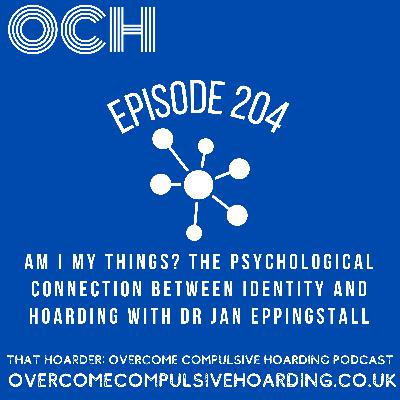
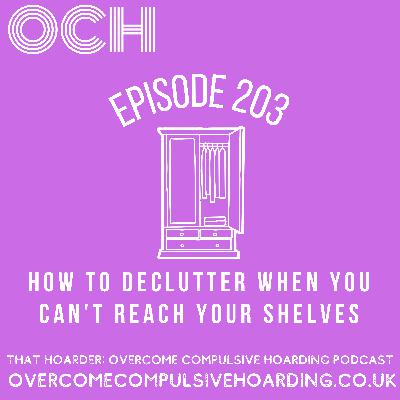

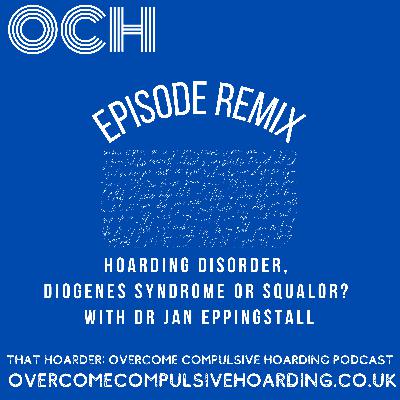
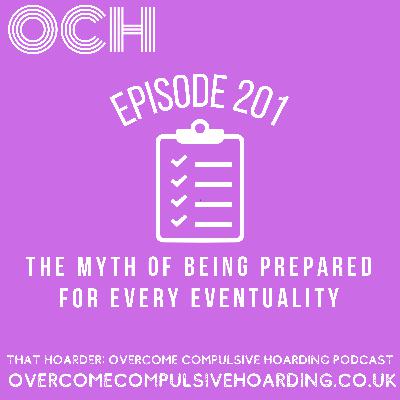

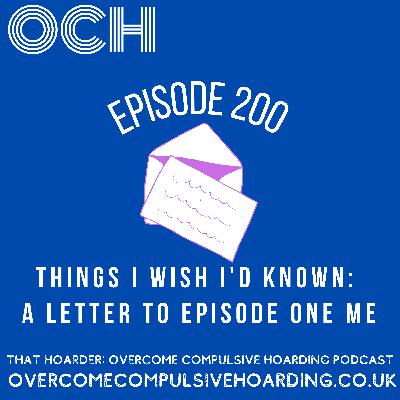


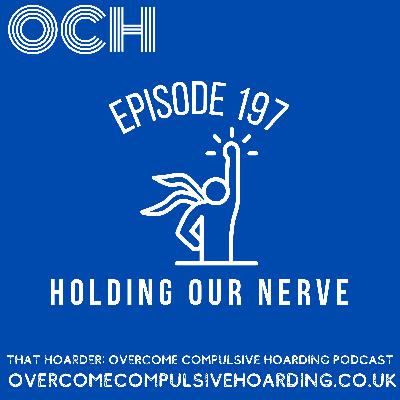
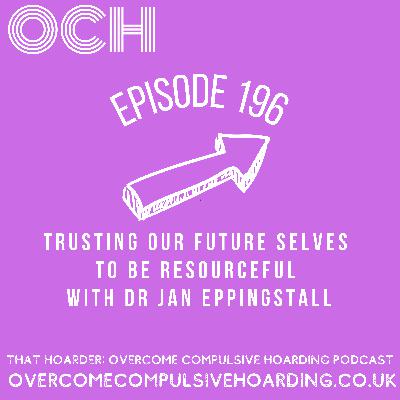


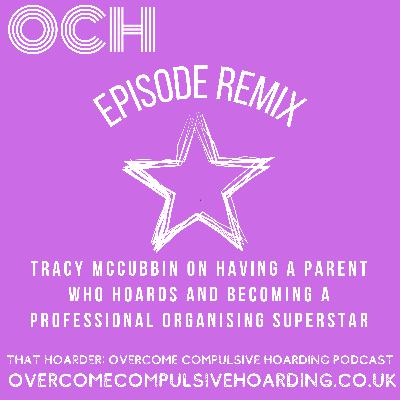

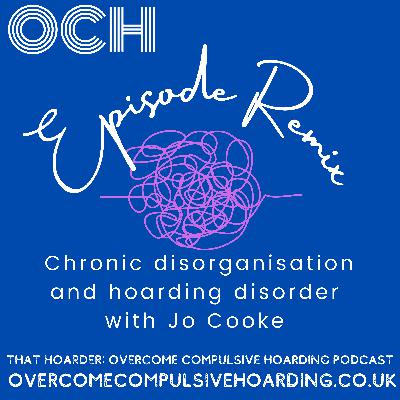
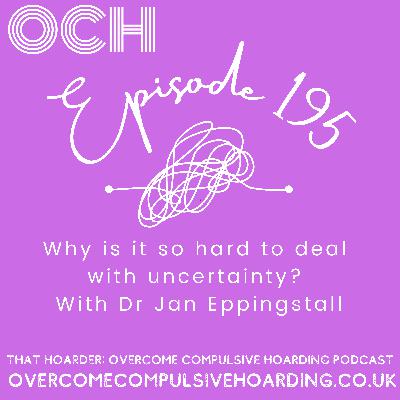

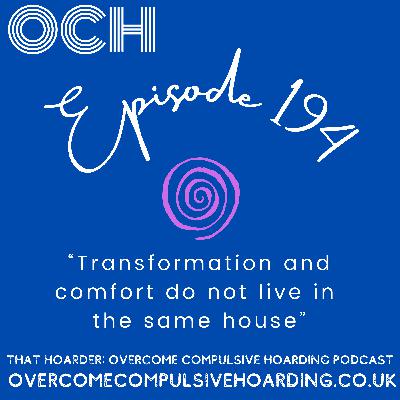



I've never thought about the hoarder as one aspect of ADHD👌
Wow! This one really got me. I am a child of an alcholic hoarder and I am still broken, even though I am in my late 50's. I have started looking at therapy and this has made me think it is time to delve a little deeper. I know my parent was ill but can still remember being told that no-one could take me out if that situation because they would kill themselves if I went away. As an adult now I can see that this was a cruel thing to say to a child. Thank you for talking about this. I have some hoarding tendencies, though I am not hoarded, and am constantly struggling to keep my home OK. I had thought it was because I never learnt the right way!
This was such a wonderful episode, I thoroughly enjoyed it! Dr. Jan's insights were eye-opening and got to the core and the why's of hoarding, in an articulate and compassionate way. These are very helpful tidbits of information, and I will try to implement them. Truly loving this podcast!!